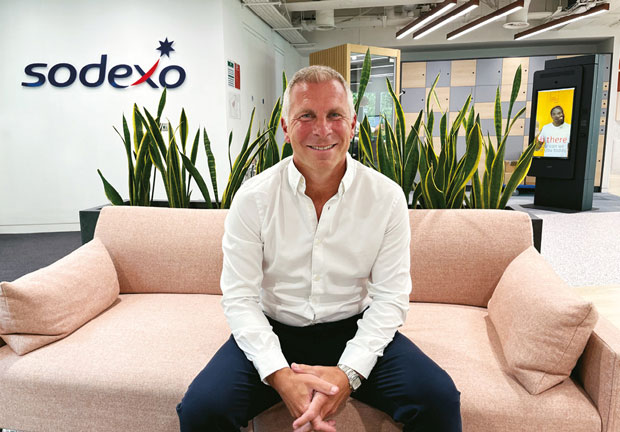Simon Lilley, Director of Strategy and Marketing for Sodexo UK & Ireland’s Health & Care business explains to Sara Bean how working in partnership with healthcare providers is helping improve patient care in and out of hospital
Recent issues of FMJ have explored the influences of the hospitality and travel businesses on the FM sector, but it’s not confined to office workplaces, as Simon Lilley, Director of Strategy and Marketing for Sodexo’s Health & Care business can confirm. Lilley’s career has spanned the airline sector, the NHS and now Sodexo’s healthcare portfolio, where he believes the power of change is driving services that help improve patient health outcomes.
Lilley began his career in the airline industry, working at British Airways which he says allowed him, in the early part of his career to be unafraid to “think big when making changes”. He then moved into a Director of Marketing role at Flybe where he learned how to push boundaries, be brave, and (he confesses) led the airline to be the first globally to charge passengers for hold baggage.
The move into a Commercial Director role within the NHS was inspired by his involvement in a hospital and a primary care group in Somerset that comprised an executive team of people from outside healthcare, including airlines, IT and the fitness sector. The group worked with an academic organisation that stratified the population in Somerset to identify complex patients being frequently readmitted to hospital.
He explains: “They wanted a fresh set of eyes to look at this challenge with a less traditional perspective on things, as it’s easy when you’ve been in the NHS for a period of time to get limited by the operational pressures.”
The team created a profile for these patients and put in place interventions that addressed the reasons for their frequent hospital admittances, resulting in the development of new models for patient care services that improved complex patient’s outcomes.
Says Lilley: “You take some of those learnings and you think well, why can’t Sodexo help deliver that for the NHS, as it’s not always about clinical issues, more often than not, it’s about the non-clinical aspects of people’s lives.”
SODEXO HEALTH AND CARE BUSINESS
These varied experiences have shaped Lilley’s ability to drive transformations within Sodexo’s Health & Care business, which provides of a wide range of services to healthcare providers, including patient nutrition, catering, food services, retail, infection prevention and wellbeing. Sodexo operates about 120 different sites, predominantly to NHS acute hospitals, although it also serves some private hospital groups, for instance all the Nuffield hospitals, and it has a small footprint in the seniors’ care home market.
According to Lilley, working within the NHS brings a range of challenges, including cost pressures, operational flow, patients and staff wellbeing, and compliance. Here a range of services are being introduced that go beyond the norm to help address those challenges, especially as the government is looking for savings generated through outsourcing public services.
Says Lilley: “I genuinely think that over the next five years, we’re going to see more of a move towards outsourcing within the NHS. For the NHS, financial efficiencies are key along with addressing the continued challenge of staff shortages. Even Jim Mackey, Chief Executive of NHS England is advising hospitals to find new ways of delivering outsourced support services rather than in-house.”
Efficiencies provided by Sodexo includes taking on patient core services, in particular patient food that is not only freshly cooked but delivered from off site, leaving more space for clinical areas. To help reduce energy costs and achieve compliance Sodexo has partnered with Xempla, using its AI based asset performance management platform provides insights, automaton, and AI-powered assistance to help maintenance teams improve efficiencies. At one site, in just over 18 months, 2,000 tons of carbon emissions were saved by using the data to switch assets off at certain times in the day. Meanwhile data and insights from a WasteWatch programme, identify areas where food waste is occurring, resulting in huge cost savings across several hospitals, including Nuffield Health.
Says Lilley: “Where we’ve taken over contracts that were previously in-sourced, clients often see the level of governance and process granularity that companies like Sodexo deliver is greater than when delivered in-house, plus as stated by Institute for Government, savings of 7.5 per cent are forecast by outsourcing public services.”
REDUCING BOUNCE BACK
But it is in in addressing the ‘flow’ of patients says Lilley where Sodexo has gone beyond the norm of delivering food and drink to patients and running staff restaurants.
“We decided when I came into this post about five years ago that with my NHS experience, we would use population health analytics to stratify patients to determine who were most likely to become the ‘frequent flyers’ in the future and how we could use interventions to prevent them being readmitted to hospital so often.
“We began to engage with NHS leaders across the country and ask them how we could help and one of the issues was the patients that continue to be readmitted. If they are discharged but haven’t got the support in their home lives they tend to ‘bounce back’ into hospital.”
 Sodexo Health & Care has developed a service called Onward Care; a 12-week service which is run in partnership with an NHS Trust and is aimed at patients who are discharged without any care package, who may not qualify for full social care support but require some support at home. Services may include a deep clean of their home before they’re discharged, a particular boon for asthmatic patients, the installation of handrails to improve safety along with telephone and in-person visits during the 12-week period. The team may also install remote monitoring in their homes to assess if they’re moving around and even monitor kettle usage to see if they’re making drinks and staying hydrated.
Sodexo Health & Care has developed a service called Onward Care; a 12-week service which is run in partnership with an NHS Trust and is aimed at patients who are discharged without any care package, who may not qualify for full social care support but require some support at home. Services may include a deep clean of their home before they’re discharged, a particular boon for asthmatic patients, the installation of handrails to improve safety along with telephone and in-person visits during the 12-week period. The team may also install remote monitoring in their homes to assess if they’re moving around and even monitor kettle usage to see if they’re making drinks and staying hydrated.
Says Lilley: “We’ve reduced readmission beds by 71 per cent for those patients, and not only does it improve the patient experience, but it also potentially frees up beds for elective use. It also addresses health inequalities, as we know these problems are worse in certain areas.”





